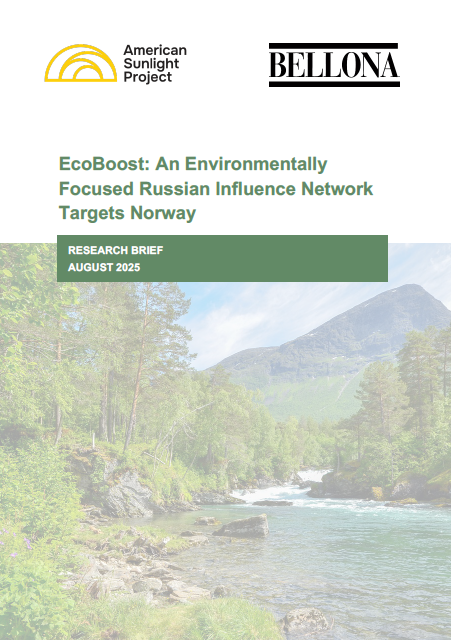
EcoBoost: An Environmentally Focused Russian Influence Network Targets Norway
The American Sunlight Project and the Bellona Foundation show in this brief how the Russian bot network EcoBoost systematically manipulates climate a...
Publication

Publication
Compared with the rapid increase of EVs in Norway, the roll-out of charging stations has been too slow. The effort to increase charging points and develop a robust infrastructure must be intensified to benefit both the local environment and the global climate. In addition, the increasing number EVs on the road in Norway place a higher demand for an excellent charging infrastructure.
eRoute71 focuses mainly on establishing cost-effective semi-rapid charging points with a power range between 6- 22 kW, which is equivalent to between 25- 100 km charged/hour). The project offers a flexible charging mechanism that allows as many cars as possible to charge with a limited electricity source. This also involves a charging mechanism that considers the prices of power from local utilities.
In the summer of 2014 Bellona, Salto and Sønnico completed phase 1 of the eRoute71 project by completing a charging corridor between Trondheim and Nordkapp in Norway. This experience gave the company valuable experience for further developement of cost-effective charging points. During 2014/15 another 13 charging stations with a total of 59 charging points were established with support from local municipalities, local enterprises and state-funded Transnova. Latest figures from November 2015 indicate that eRoute has constructed 21 charging stations with 74 charging points and now aims to expand its re-charging infrastructure across all of Norway.
However, there is currently no viable business case for installing EV-charging stations. The market is expected to mature as sales of EVs in Norway continue to soar: in September 2015 there were in total 66.276 EVs on Norwegian roads, and the market share for EVs until Q3 is at an average of 17,6%, the equivalent to every fifth new car sold in Norway being electric. At present EV-owners enjoy free charging at many sites, but in a long-term perspective EV-owners will have to accept that charging is a service that must be paid for. This is turn creates the market needed for building charging infrastructure. Bellona aims to take a leading role in this field and establish charging stations with integrated payment systems at large traffic junctions and other convenient stopping places for drivers. By establishing charging infrastructure at already established commercial sites, affiliated companies benefit by enjoying customers with relatively longer time to spare.